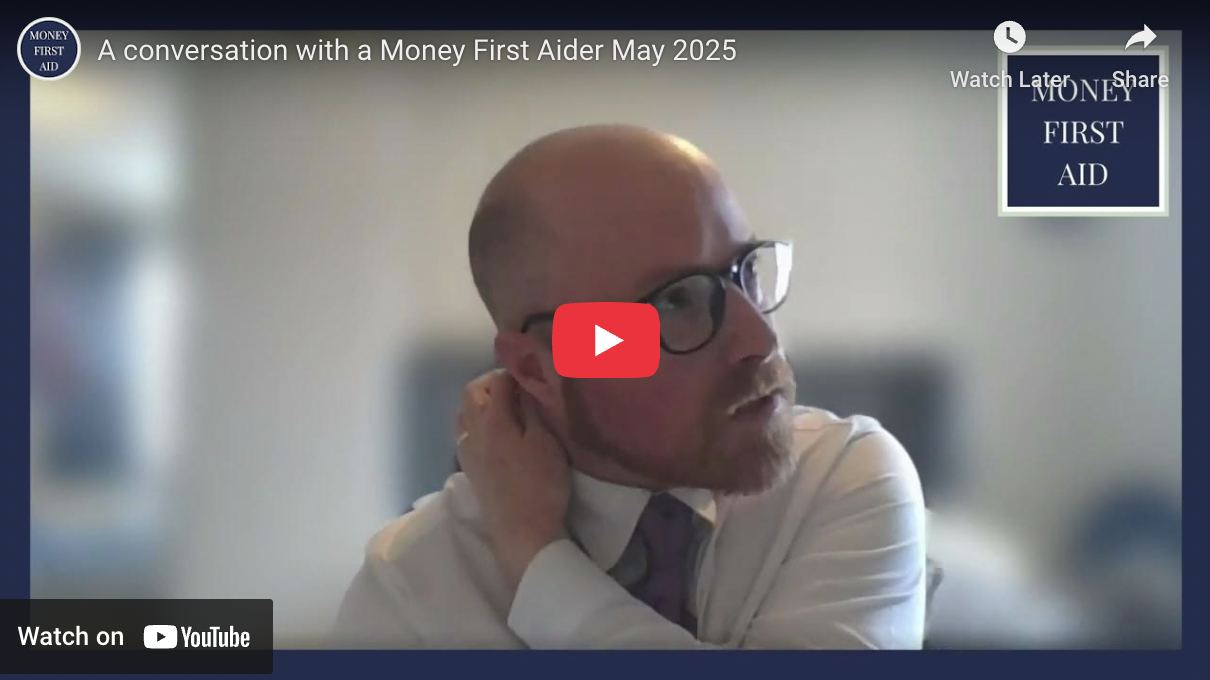Money and Men's Health Week
Each year in June, Men’s Health Week shines a spotlight on the physical and mental health challenges that disproportionately affect men. From heart disease to suicide, men often face significant health issues – and yet, they’re far less likely to talk about them. And while the focus is often on physical and emotional wellbeing, one vital part of the conversation is often overlooked: money.
At Money First Aid, we believe financial wellbeing is a cornerstone of overall health. In this blog, we explore how money problems can impact men’s health, why men can struggle to speak up, and what employers, colleagues, and friends can do to help change the conversation.
The silent stressor: money
Money is one of the leading causes of stress in the UK, with 86% of employees feeling increasingly stressed about their finances. But for men, that stress often stays hidden.
Whether it’s struggling to keep up with rent, juggling debt, supporting a family on a low income, or feeling like they’re failing to live up to financial expectations, many men internalise money worries – and this can have a devastating effect on their health.
The health impact of money stress on men
Persistent money worries are linked to:
Poor sleep
Increased anxiety and depression
High blood pressure
Relationship breakdowns
Poorer work performance
Suicidal thoughts and death by suicide
Men in particular are less likely to access mental health services and more likely to turn to harmful coping mechanisms like alcohol, gambling, or overworking.
The statistics are sobering. Four in five suicides are by men, with suicide the biggest cause of death for men under 35. While there are many complex reasons behind this, financial stress is often a major factor – one that too often goes unspoken and unaddressed.
Why don’t men talk about money?
Society has long taught men to associate their value with financial success. “Providing for the family,” “being the breadwinner,” or “having it all together” are still deeply ingrained expectations.
So what happens when a man feels like he’s failing at those things? Too often, shame kicks in, and conversations about money – especially if there’s a problem – are avoided. Men might worry about being judged, seeming weak, or burdening others. They might say nothing at all, trying to solve it in isolation, until a crisis point is reached.
At Money First Aid, we’ve heard this time and again in the workplace. Men who feel ashamed to admit they were behind on bills or how much they’re in debt. Colleagues who smiled on the outside while secretly facing a gambling addiction. It doesn’t have to be this way.
Workplaces have a role to play
Men spend a large portion of their lives at work – and for many, their workplace might be the only structured support system they have access to. That means employers and colleagues have a powerful opportunity during Men’s Health Week and beyond to open up the conversation around financial wellbeing.
Here’s how:
1. Make money talk part of your wellbeing strategy
Just as you promote mental health first aid or physical health check-ups, include financial health as part of your wellbeing approach. Access to support, resources, and non-judgemental conversations can be all it takes to help men recognise they don’t need to be ashamed or tackle these challenges alone.
2. Train Money First Aiders
One of the most effective ways to support your team is by training individuals to become Money First Aiders. Much like a mental health first aider, a Money First Aider® is trained to spot the signs of financial stress and have supportive, confidential conversations with colleagues.
They’re not there to give financial advice – but they are trained to listen without judgement, ask the right questions, and signpost to appropriate help, whether that’s debt advice, employee benefits, or mental health support.
3. Tackle stigma head-on
Use Men’s Health Week to run awareness campaigns, host talks or drop-in sessions, or simply share anonymous stories. The more men see others speaking up, the safer it will feel to open up themselves.
Real talk: what men have told us
Through our training sessions and case studies, we’ve heard real, moving stories from men who finally opened up about money worries – often for the first time. In many cases, it was a conversation with a trained colleague that made the difference.
One of our Money First Aiders explained just that – how a colleague had been struggling for over 12 months, with no one to turn to. When they introduced Money First Aiders, it became the catalyst for him to finally get support from a trusted colleague. As he says in the video – he’s now smiling again.
What you can do this Men’s Health Week
Whether you’re an employer, a colleague, or a friend, here are three ways you can make a difference:
✅ Start the conversation
A simple “How are things going at home?” or “There’s been a lot going on with cost of living and bills — is that something that’s affecting you at all?” can open the door. You don’t need to fix someone’s finances – just let them know they’re not alone.
✅ Share resources
From Citizens Advice to StepChange to your own employee assistance programme, let people know what’s out there. And don’t forget about free tools like MoneyHelper’s budget planner.
✅ Take action in your organisation
If you’re in HR, wellbeing, or management, explore how Money First Aider® training could support your team. It’s a practical, cost-effective way to create a workplace culture where financial wellbeing is taken seriously – especially for men who may be suffering in silence.
The bottom line
Men’s Health Week is a time to reflect on how we can better support the physical and mental wellbeing of men across the UK. But we can’t talk about mental health without talking about money. And we can’t expect men to speak up about money unless we create environments where they feel safe to do so.
Money First Aid is here to help organisations build that culture – one trained colleague, one safe conversation, one moment of support at a time.
This Men’s Health Week, let’s remember: a conversation about money could be the most important health intervention you ever make.
Sources: SoFi, UK Government

